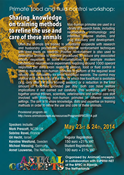The EUPRIM-Net Project WP2
Workshop on primate food and fluid control
- Sharing knowledge on training methods to refine the use and care of these animals
Non-human primates are used in a variety of research fields, including neuroscience, immunology and infectious disease studies, and drug discovery and development. Often the animals are trained to voluntarily cooperate with research and husbandry procedures, using positive reinforcement techniques with food treats as rewards. Positive reinforcement is also used to desensitise animals to aversive procedures, to reduce any associated anxiety responses. In some circumstances, for example modern behavioural neuroscience experiments requiring around 1000 operant responses per daily brain recording session, food or fluid control is used to motivate non-human primates to perform at the required level reliably and consistently for small food/fluid rewards. The control may involve strict scheduling of the time for which free food/fluid is available (e.g. only after the daily training session) or a reduction in the total amount of food/fluid provided per day; both can have welfare implications if not carried out carefully. This workshop will bring together animal trainers, scientists, veterinarians and animal care staff involved with training non-human primates in different research settings. The aim is to share knowledge, data and expertise on training methods in order to refine the use and care of these animals.
[Click here for the poster; pdf; 894 kb]


